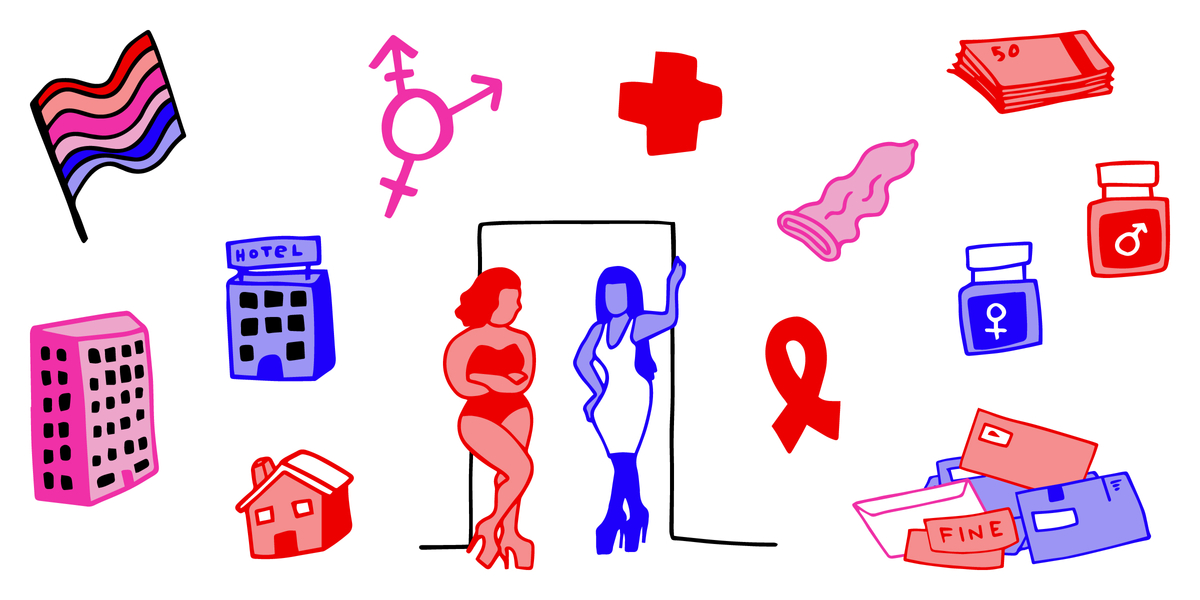
Published on 14 February 2021
The Situation of Migrant Sex Workers in The Netherlands
And why decriminalization of sex work should include everyone
A couple of months ago, I was talking with this guy - a newcomer to the Netherlands - when he mentioned that visiting the Red Light District had been a real eye-opener for him. He had never been to a place where “anything goes” before; cis and trans sex workers in the windows, weed, you name it. He said he really enjoyed using the “services” available. Fast forward into our conversation, when he asked me what my activism was about I replied that sex work emancipation was one of my topics of interest. In a most nonchalant way, he then said he was against prostitution. Why? I asked him. Because the majority of women who do prostitution are forced to do it, he replied. I tried to educate him about how broad the scope of sex work is, yet it felt like I was talking to a wall.
I am a trans woman with a sex work history, and in my experience it was not any person who forced me to do it, but it was a set of circumstances.
This got me thinking. It was not the first time I had heard sweeping statements like this from people, that prostitution can only be done by women against their will and that it should be outlawed altogether to protect them. I am a trans woman with a sex work history, and in my experience it was not any person who forced me to do it, but it was a set of circumstances. Poverty and lack of access to any other way to generate income were the main reasons I joined the trade. It was also the empowering feeling of being valued for my body and my time. Back when I did sex work, it was in a place where it was not only illegal, but if arrested by police - which happened several times - I also risked being deported. I wish I could tell this guy that sex work was not the problem, but the lack of opportunities and punitive laws were the actual issue.
How do you explain to a ”normal” person (he/she with voting power) that sex work has many angles, and that many times the problem is not sex work per se but how society sees and treats sex workers. Especially, how it treats sex workers from marginalized communities, like single mothers, migrants, people living with HIV, trans women, black people, Roma, and so on.
For the past year, I've been working on a report on the Situation of Migrant Sex Workers in the Netherlands, a community-led project made in collaboration with the SAVE Campaign, Trans United Europe, PROUD, and ICRSE. For this report we delved into the lived experiences of non-native Dutch sex workers in the Netherlands, who work in an overregulated system that does not take into account the needs of undocumented, migrant, refugee, and trans sex workers.
In this research report we included the experiences of migrant female and trans sex workers, but also those of male sex workers - a group that tends to be overlooked. Our participants’ pool came from different countries in Europe, but also from countries in the Americas and other regions of the world. We strove to include not only those working legally, but also those working undocumented.
The conclusion of the report is that even if sex work is legal in the Netherlands, the way it is regulated leaves a lot to be desired. The system can barely be navigated because every municipality has different, yet equally restrictive, regulations. Regulations around licensing have created a two-tier system with some sex workers working in the licensed sector and many in the unlicensed sector. Non-European sex workers without a visa are by default excluded from the licensed sector, because prostitution is the only employment in the Netherlands for which the law prohibits the issuing of a work permit. Working without a permit forces people to go underground, which in turn creates a catch-22 situation of more problems and precarization.
Furthermore, since the current legislation and public opinion, more often than not, conflate sex work with trafficking, those pushed to work underground - especially when working among peers to feel safer - risk being misunderstood as running a illegal brothel and can be mistreated by the police.
Restrictive migration policies are making it difficult, if not impossible, for undocumented migrants to work legally.
The report ends by pointing out that governmental policies, which often serve to legitimize prejudice and stem from the idea that sex work is immoral or that sex workers are victims without agency who need to be rescued, harm sex workers more than they help them. Restrictive migration policies are making it difficult, if not impossible, for undocumented migrants to work legally.
The overarching recommendation of the report is to unequivocally decriminalize sex work and to treat sex work equally to other types of work. This would be the best way to lessen stigma and thereby the financial, social, emotional, and physical violence that is caused by it. This should apply to all sex workers, not just Dutch nationals, but also those of migrant background and undocumented sex workers.
I think tools like this research report are paramount to show policymakers, but also “regular people” like the guy I mentioned in the first paragraph, how complex sex work really is. This report is also important for us migrant sex workers, and especially those with multiple intersecting marginalised identities, to better understand and defend our community. Please share it with friends and allies - and your local politician. It may change a mind or two. As for the guy, I have already sent him a link to the report, so he can do a little more than just hear himself talk.
You can find a summary of the report and download the full report here.

Alejandra Ortiz
Alejandra Ortiz is a Mexican trans woman. She works with projects and organizations that empower bicultural trans-migrants and refugees, sexworkers and persons living with HIV. Such as TUE, TranScreen Film Festival, ICRSE, TNN and Papaya Kuir among others.
